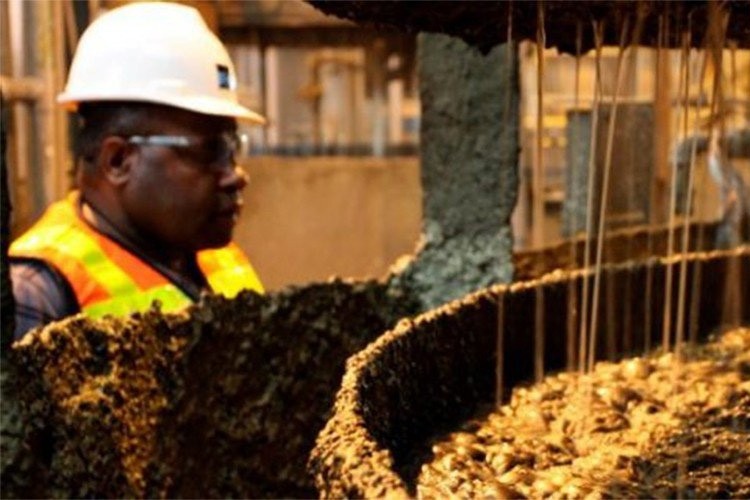Popular Reads
Top Results
Can't find what you're looking for?
View all search resultsPopular Reads
Top Results
Can't find what you're looking for?
View all search resultsIndonesia pledges leeway for obedient miners
Change text size
Gift Premium Articles
to Anyone
T
he government has reiterated that local miners, particularly nickel, bauxite and copper miners, will be allowed to export their products should they express a commitment to build their own smelters and be able to supply domestic smelters with at least 30 percent of their input capacity.
President Joko “Jokowi” Widodo’s administration issued on Jan. 11 the fourth revision to Government Regulation No. 23/2010 on the management of mineral and coal businesses, which allows miners to continue exporting copper concentrates, certain amounts of low-grade nickel ore and washed bauxite under certain conditions.
“Nickel and bauxite miners can export after supplying 30 percent of the input of existing domestic smelters. They also have to be committed to building their own smelters within five years,” Energy and Mineral Resources Minister Ignasius Jonan said Saturday in a press briefing.
“We will monitor [the progress] every six months. If they fail to fulfill the commitment to build the smelters, there will be no export licenses for nickel and bauxite miners.”
Jonan said there had been a misunderstanding over the newly-launched regulation, as many people interpreted that it was forcing local miners to funnel 30 percent of their nickel or bauxite production into local smelters, even though, he said, the correct calculation was based on the total capacity of all domestic smelters.
For instance, the total input capacity of nickel smelters in the country currently stands at 16 million tons per year. Meanwhile, the total production for low-grade nickel — with nickel content below 1.7 percent — stands at 10 million tons per year.
“So that means the nickel miners must sell to domestic smelters for about 30 percent of the 16 million tons of smelter capacity, or equal to 4.8 million tons, not of the 10 million tons of production capacity,” he said.
The government, Jonan continued, would serve as the “traffic manager” for the supply chain system in order to prevent unfair implementation of the regulation. For example, this is possible if there are only two or three companies supplying 4.8 million tons of nickel to local smelters through their own production.
According to the Processing and Smelting Companies Association (AP3I), 32 new smelters have been built in the country — 24 of which are nickel smelters — within the past four years with a total investment value of around US$20 billion.
The ban was a boon to rival producers as their output filled the hole, Bloomberg reported.
The Philippines became the world’s biggest supplier of mined nickel and the largest shipper to China. Now, their shares are tumbling. Nickel Asia Corp., the country’s top producer, fell 14 percent on Friday along with Japan’s Sumitomo Metal Mining Co. and GMK Norilsk Nickel PJSC.
The change in regulations may also upset Chinese investors that pumped money into developing Indonesia’s domestic processing industry. Citigroup had forecast a 180 percent increase in capacity by 2020, to about 400,000 tons, according to Bloomberg.
The 2009 Mining Law stipulates a mineral ore export ban to encourage smelter development in the country and to strengthen the processing sector. It has been applied to nickel, bauxite, chromium, gold, silver and tin.
However, because none of the proposed smelters were completed, including the one committed to by gold and copper miner Freeport Indonesia, the government has been forced to issue a new regulation extending export permits for certain mineral ores.
One of the requirements for miners to get an export recommendation from the government is to convert their permit status from a contract of work (CoW) to a special mining license (IUPK).
The government stated that Freeport Indonesia, the subsidiary of US giant Freeport McMoRan, had submitted an official letter confirming its commitment to convert its CoW into an IUPK. “They also mentioned their commitment to build the smelter within five years. If so, we will issue the export recommendation for them immediately,” Jonan said.
Freeport Indonesia claims it has allocated $2.2 billion in capital expenditure for the new smelter development, even though only $212.9 million has been disbursed so far, including $115 million as collateral to the government and $50 million to work on the smelter’s environmental impact analysis (Amdal) document and basic engineering.
“Freeport Indonesia has presented to the government its willingness to convert [its CoW] into an IUPK, that will happen if there is an agreement over investment stability and also fiscal and legal certainty,” Freeport Indonesia spokesman Riza Pratama told
The Jakarta Post on Sunday. The company has also confirmed its commitment to continue its new smelter development soon after it receives certainty over its contract extension for its Grasberg mine in Papua, the world’s largest gold mine and third-largest copper mine.
Freeport Indonesia’s contract is due to expire in 2021. However, the earliest miners can renegotiate their contracts is five years before they expire under the latest regulation.










